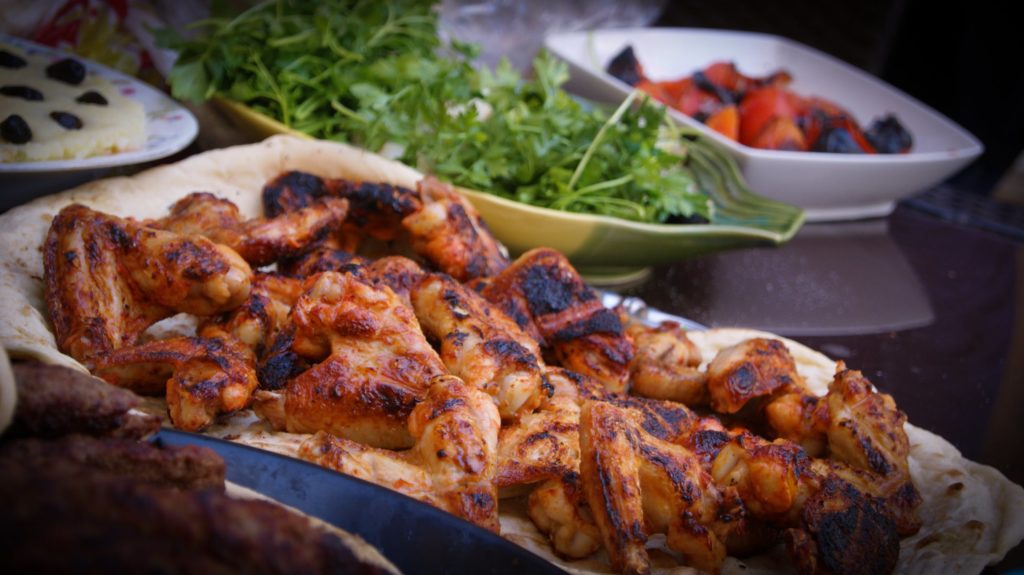Every time I cook, I feel a need to put on music. It’s most often R&B to ring through the kitchen as I prepare food. It’s always music that’s easy to love by a variety of ages and tastes. It always feels like the most natural thing to do.
When I cook near white people, however, I always feel a strange pressure to turn the music off and chat instead. Why is that?
We all know that Black culture and food have a very close tie. Soul food is an important staple in the culture. However, part of that ‘food of the soul’ isn’t just the food. It’s the food, the people, the community and (more important than I realized) the music.

What makes a meal feel Black?
Imagine the following:
You wake up to soft colors, music, and the smell of food. You stumble into your kitchen and find the eldest member of the family (often a woman or most talented chef) cooking. She probably shoos you out of the kitchen.
There are other family members nearby, so you wait with them. Music – controlled by the cook – can be heard. You talk and joke with the others, all while keeping the kitchen in sight. The bustle helps you get emotionally prepared for the day.
Even when there are gaps in conversation, the music fills your ears with flowing notes. As people set the table, soul music fills the air. Everyone starts to sing.
The music dims as conversation rages on loudly and passionately. Your family starts to eat.
Even after the food is gone, you all sit and chat a while. Eventually, everyone fades out to go on with their day. Who ever is cleaning turns on new music until they are done.
Later in the day the cycle repeats with more lingering, maybe drinks and game.
What’s going on here?
The above passage illustrates a typical breakfast for a member of a Black family. As you can see, food is only a part of the ritual.
Walk into any good soul food restaurant and it will probably be playing either gospel or R&B. These genres include songs that have been woven into meal time since birth, and most of the room knows the words. People quietly or loudly sing along, hum to themselves and generally bop.
However, this music sharing goes beyond restaurants. Many Black families also do this in their homes.
Things to consider
Often times, well meaning people will get catered soul food… but miss this step, or request Black Americans to turn down the music. I was unable to put my finger on why for many many months. Tonight it hit me: White Americans’ meals are silent outside of romance. The focus is on talking briefly and getting the meal over with to go sit in another room and chat. Plates are left behind for quiet discussion over whiskey, with soft ambient music playing. It’s a time for important deep topics and general catching up between friends. At home, everyone splits into their bedrooms almost right after.
In Black culture, meals – like church – take forever. Sometimes I’ve taken non-Black Americans out to soul food and have to remember to tell/remind them it’s going to take a while. They almost always underestimate me on this and get antsy about half an hour in.
I recently sat with some friends listening and enjoying the music. As I sat, I noticed all the other Black Americans were doing the same. Limited phone usage; just engagement with their company and the server. Everyone was present to share in this moment of meal time with everyone else.
I looked to my white friends and chuckled at their shifting. While we stayed present, they all stared at their phones.
One of the most beautiful things about Black culture is how we feel time is more precious than expectations. It’s not about being on time but in time. The meal will play itself out as a time for connection, so why rush it? The music is the time keeper, the filler and the glue that helps hold us together. No matter our age, religion, finances, and background, music is a way for us to come together and be seen. It’s just another way to feed the soul.
If you are a trying to make a space feel more in line with what Black Americans are used to, here is an easy way to do so: Turn on some good, well known, Black music. Feel free to slow down, talk a little louder, and let the moment extend. Remember: This is a time to check in and be present with your community and loved ones.


